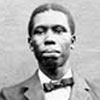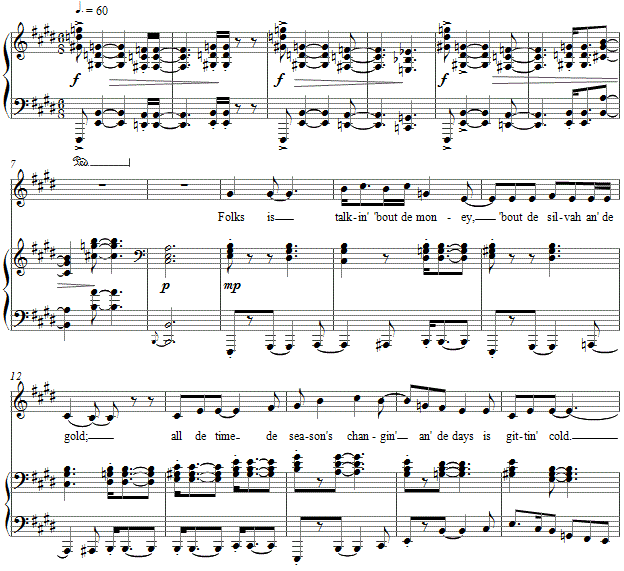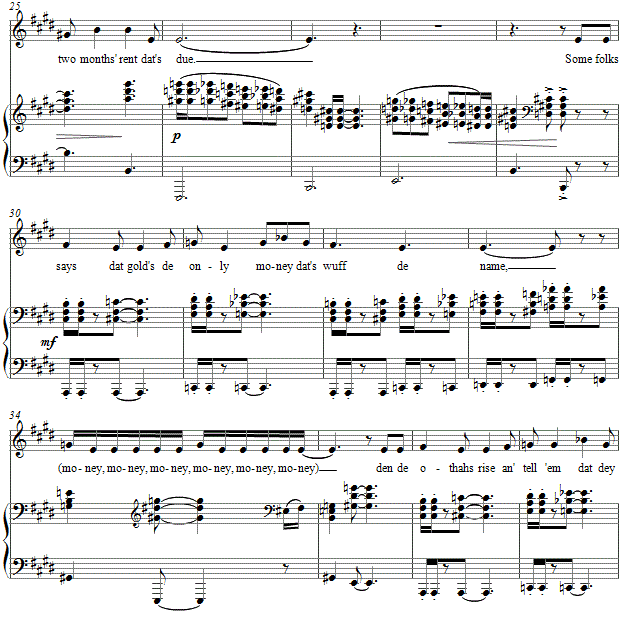Music and Texts of GARY BACHLUND
Vocal Music | Piano | Organ | Chamber Music | Orchestral | Articles and Commentary | Poems and Stories | Miscellany | FAQs
The Real Question - (2010)
Paul Laurence Dunbar
for medium voice and piano
Folks is talkin’ ‘bout de money, ‘bout de silvah an’ de gold;
All de time de season ‘s changin’ an’ de days is gittin’ cold.
An’ dey ‘s wond’rin’ ‘bout de metals, whethah we ‘ll have one er two.
While de price o’ coal is risin’ an’ dey’s two months’ rent dat’s due.
Some folks says dat gold‘s de only money dat is wuff de name,
Den de othahs rise an’ tell ‘em dat dey ought to be ashame,
An’ dat silvah is de only thing to save us f’om de powah
Of de gold-bug ragin’ ‘roun’ an’ seekin’ who he may devowah.
Well, you folks kin keep on shoutin’ wif yo’ gold er silvah cry,
But I tell you people hams is sceerce an’ fowls is roostin’ high.
An’ hit ain’t de so’t o’ money dat is pesterin’ my min’,
But de question I want answehed ‘s how to get at any kin’![ 5 pages, circa 2' 45" ]
Paul Laurence Dunbar
The text is found in Dunbar's collection, Joggin' Erlong, 1906. In a day and age over one hundred years later than this poem's writing, the subject in news as in the public dialogue in general is the pursuit of money. I find it enlightening that as social and historical eras pass, we gain insight into which myths carried truths and which myths carried lies.
Among the great lies of the last century and more has been the myth of social welfare, undergirded by the same political philosophy of socialism as the murderous regimes of the twentieth century. In the softer incarnation of socialism as seen in Europe and the United States, we are now seeing the budgetary woes of which is laughingly called "public debt." While the criticism of capital and the marketplace based on profit has been very trendy, it comes to be seen that in fact while capitalism seeks profit and growth and resulting profits, socialism in its softer forms relies even more on growth and the resulting profits. When the lean years come around in a cycle, as one might read from the biblical stories of Joseph in Egypt, the wisdom of thousands of years still is modern and up to date. Whole nations mired in debt should have in fact been more austere before austerity was forced upon them. But the seduction of socialism and the truth of its true reliance on capital, growth and profits promised another "way." That other way has led whole nations into debt slavery, as it seems.
This poem is a reminder that the the fundamental question of economics for the individual remains "how to get at any kin'." As we watch, local, state and national governments are beginning to face the same age old questions -- which have been answered for us over millennia, and ignored by the sway of hugely fallacious, modern myths, especially the destructive myth of public debt as a means of financing social welfare. The real question? How to get money in an age of austerity. The answer? As always, produce, save and invest wisely. But not borrow even more.
The setting in E uses the "blue" seven chord forms with their major and minor thirds, alongside a simple syncopation within the duple meter of threes. The form is a basic A-B-A.
The chromatic "slip" chords lead down to a bridge beginning on the subdominant, before a return to the opening gestures and second "verse."
The score for The Real Question is available as a free PDF download, though any major commercial performance or recording of the work is prohibited without prior arrangement with the composer. Click on the graphic below for this piano-vocal score.


